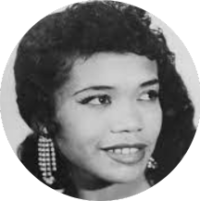Sugar Pie  DeSanto packed astonishing power and plenty of personality into a tiny frame. Her spunk and vigor impressed bandleader and producer Johnny Otis enough to sign her to her first recording session in 1955 after witnessing her performance at a San Francisco talent show. It was Otis who named her Sugar Pie in preference to using her given name, Peylia Balinton. A ballet student as a child, she was born in Brooklyn on October 16, 1935, to a Filipino father and African American mother, but grew up in the Bay Area and continued to live there except for a spell in Chicago when she was with Chess Records in the 1960s. After her 1955 debut for Federal Records, Sugar Pie recorded a few more singles, often with her husband, guitarist Alvin Parham, aka Pee Wee Kingsley, acquiring the DeSanto moniker from producer/DJ/club owner Don Barksdale.
DeSanto packed astonishing power and plenty of personality into a tiny frame. Her spunk and vigor impressed bandleader and producer Johnny Otis enough to sign her to her first recording session in 1955 after witnessing her performance at a San Francisco talent show. It was Otis who named her Sugar Pie in preference to using her given name, Peylia Balinton. A ballet student as a child, she was born in Brooklyn on October 16, 1935, to a Filipino father and African American mother, but grew up in the Bay Area and continued to live there except for a spell in Chicago when she was with Chess Records in the 1960s. After her 1955 debut for Federal Records, Sugar Pie recorded a few more singles, often with her husband, guitarist Alvin Parham, aka Pee Wee Kingsley, acquiring the DeSanto moniker from producer/DJ/club owner Don Barksdale.
Her biggest hit, “I Want to Know,” produced by Bob Geddins on the Veltone label, rose to No. 4 on Billboard’s R&B chart in 1960 and led to a contract with Chess. The DeSanto magic also energized the already dynamic James Brown revue for two years. During her tenure with Chess, she had some hits on the subsidiary Checker label, including “Slip-In Mules,” an answer to Tommy Tucker’s “Hi-Heel Sneakers, and “In the Basement” on the Cadet imprint, a duet with longtime friend Etta James, who was often at the Balinton home as a youngster. Sugar Pie’s records also clicked with the Northern Soul crowd in England, enough so that she left the all-star cast of the 1964 American Folk Blues Festival’s European tour to make U.K. appearances of her own. Under various names including Peylia Parham and P. Parham DeSanto she began writing songs for other artists at Chess, including Billy Stewart, Fontella Bass, and Little Milton. Sugar Pie took her act back to Oakland and remained active and still saucy even into her octogenarian years, a local favorite as well as a world traveler.
When times were slow, she worked as a paralegal. The Rhythm & Blues Foundation provided support after she lost her husband Jessie Davis in a fire at their apartment. The Foundation also presented her with a Pioneer Award, one of several honors she has earned from various sponsors, including the Arhoolie Foundation and Blues Blast magazine. She found a recording home with her manager James C. Moore’s Jasman label, which began releasing DeSanto’s output in 1972, sprinkling her catalog with titles befitting her persona such as Sugar Is Salty, Refined Sugar, and Sugar’s Suite.
